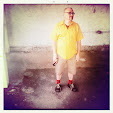One day during the free love of the 60s,
a boy, looking like a haggard man,
popped his head from the manhole
of his Mother's womb
escaping the sour amniotic
that he'd lived with for too long.
A masked man grabbed him,
turned him over and bruised his ass
for the first time.
He cried.
His sister decided to remain below
and savor the erotic world of womanhood.
She liked being inside the uterus,
worshipping it's beauty
and eating it's delicate food.
She knew the outside world
would not tolerate her desire
for such a preference.
But they cut her out.
And she cried.
The parents, sappy with tradition,
named them Hansel and Gretel.
For twelve years they lived behind
the barricade of a white picket fence.
Hansel would prance in his Mother's heels
while Gretel challenged
Johnny Bench's Batter Up.
They did what felt natural.
Warnings of damnation
made them feel guilty
but could not change their ways.
They called Hansel
a mama's boy
but secrets knew
he belonged to papa.
Bruises, fleshy as eggplants,
hidden by Fruit of the Loom
stretched the length of childhood
and planted him in a dream
of cauldrons and warts.
Gretel corked her eyes
to the drama until
the day Hansel could accept
his Father's devotion with ease
and she became the object
of drunken patrimony.
She protested knowing this was not
her lot in life,
but muscles outweigh reason.
Each night
she thought of ways
to lead her brother
from this secret suburban forest
and into a world where
there was no fear of witches.
A slumber dripping with sweet dreams.
A land that would welcome them
without the price of midnight visits.
On Mother's 39th birthday
a jolt of nicotine bolted it's way
to her coronary
sending her to the ground
with a terminal thud.
The tears burned
her children's cheeks
as the embalming fluid
stung her veins.
After Mother's abandonment
Gretel was forced to quit
her habit of climbing trees
and knot around her waist
the strings of an apron too big
for her empty hips.
It was now her burden
to fuel Father's addiction
when he returned from work.
Father's senses were so dumb
that each night
before he lapped
at the adolescent meals,
Gretel would kiss his cocktail
with a spoon of arsenic.
It did nothing
but bless his poison blood
and strengthen his grip.
A soused night later
he slipped on a roller-skate
and tumbled down the stairs
like a dusty weed.
His fall was in vain
for a broken leg did nothing
but confine him to his bed
and Hansel's bed
and Gretel's bed.
For the length of a moon's trail
Gretel schemed of ways
to snuff Father's last breath.
She patiently waited for Fall
knowing this was the season
when death was in bloom.
It seemed appropriate
for his body to rot
with the used leaves.
Her chance at freedom
was a day of thanks.
She prepared a ritual meal
of bird and feed
while Father,
his dirt eyes
slit like paper cuts,
drank and cheered the pigskin violence
flashing from the television.
Gretel called him in
to check on the progress
of the dead fowl
bubbling in it's skin.
He leaned into the oven
in the same way that Hansel
would bend forward
when Father missed Mother
and needed release.
In one move
Gretel pushed Father in
and shut him out.
He was too numb to know.
Hansel joined his sister
at the pyre
to shrug off
the last meager efforts
of polluted pleas.
The children watched
as his eyes popped like corn
and his skin peeled
like weathered paint.
When they were sure he was dead
they removed his turkey pillow
and fed their stomachs
to digest the memory
of the monster burned like a witch.
On board a Greyhound
they raced with the moon.
Hansel dropped M&Ms from the window,
but the wind was too kind to allow for a trail back home.
He wasn't sure where they were going,
but the candied road ahead
was sure to promise a life
of happily ever after.
poem and photo copyright Robert P. Langdon







